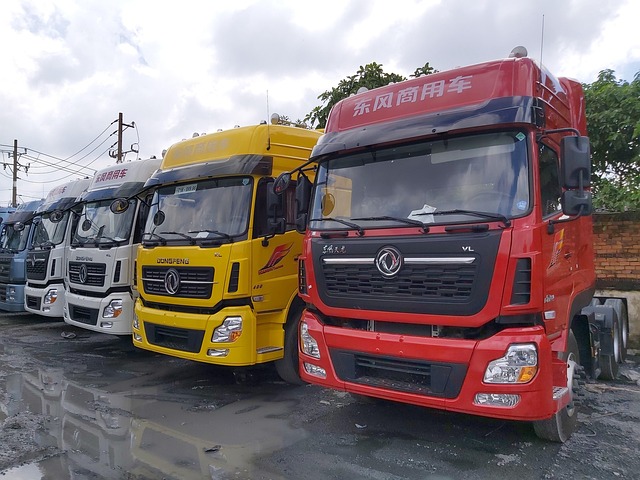Looking to register your car in California? This comprehensive guide walks you through the entire process, from understanding eligibility requirements to gathering essential documents and paying fees. We’ll also cover visiting the DMV, verifying your vehicle’s VIN (using a reliable dmv vin verifier), and ensuring compliance with state regulations. Follow these steps for a smooth registration experience in the Golden State.
- Understand Eligibility Requirements for Car Registration in California
- Gather Necessary Documents for Vehicle Registration
- Visit the DMV and Complete the Registration Process
- Verify Your Vehicle's VIN (Vehicle Identification Number)
- Pay the Required Fees for Car Registration in CA
Understand Eligibility Requirements for Car Registration in California

Before you begin the registration process, it’s crucial to understand the eligibility requirements for car registration in California. To register your vehicle, you must first ensure that your car meets all state and federal safety standards. The California Department of Motor Vehicles (DMV) requires a valid vehicle inspection, often referred to as a vin inspection, to verify that your car is safe for operation on public roads. This process involves checking the vehicle’s emissions, lights, brakes, and other critical components.
Additionally, the DMV relies on the Vehicle Identification Number (VIN) as a unique identifier for each car. A mobile vin verification or mobile vin inspection can streamline this step by allowing you to quickly and easily transmit your VIN to the DMV, ensuring that your vehicle’s record matches the provided details. By fulfilling these requirements, you’ll be well on your way to registering your car in California smoothly and efficiently.
Gather Necessary Documents for Vehicle Registration

Before you start the registration process, make sure to gather all the essential documents required by the California Department of Motor Vehicles (DMV). This includes your vehicle’s registration certificate from the previous state, a completed Application for Title and Registration (Form DVF-14), and proof of insurance. It is crucial to have the Vehicle Identification Number (VIN) verified as well; you can do this through a DMV-approved VIN verifier, either online or by conducting a mobile VIN inspection.
Additionally, you will need a valid driver’s license or state ID card, along with proof of residency, such as a utility bill or bank statement. For individuals who recently purchased the vehicle, it is recommended to bring along the sales invoice and any other documentation related to the purchase. Having these documents ready ensures a smoother registration process at your local DMV office.
Visit the DMV and Complete the Registration Process

After gathering all necessary documents, it’s time to visit your local California DMV office. Bring along proof of insurance, your vehicle’s title, and a valid driver’s license. The process typically involves filling out registration forms, providing detailed information about your car, and passing an emission test (if applicable). One crucial step is to get your Vehicle Identification Number (VIN) verified by the DMV. This can be done through their official VIN verifier, ensuring that your vehicle’s details match the recorded data.
For added convenience, some services offer mobile vin verification, allowing you to complete this process before even reaching the DMV. This streamlines the registration journey, saving you time and effort. A quick vin inspection can identify any discrepancies early on, making the registration experience smoother.
Verify Your Vehicle's VIN (Vehicle Identification Number)

Before you begin the registration process, it’s crucial to ensure your vehicle’s VIN (Vehicle Identification Number) is accurate and readily available. This unique 17-character code acts as a fingerprint for your car, making it essential for official procedures like car registration. You can verify your VIN in several ways, including using a DMV vin verifier or even through a simple mobile vin verification process.
Performing a VIN inspection early on will save you time and potential headaches later. Many car owners opt for a quick check using their smartphone apps that offer mobile vin verifier services. This modern approach allows you to confirm your vehicle’s details, including its make, model, and year, directly from the comfort of your home or even while you’re at the DMV, ensuring a smoother registration experience in California.
Pay the Required Fees for Car Registration in CA

To register your car in California, you’ll need to pay several fees, including a registration fee and a vehicle identification number (VIN) verifier cost. The California Department of Motor Vehicles (DMV) requires these payments to process your registration application. The registration fee varies based on the type of vehicle and its age, with higher fees for newer models. Additionally, you must obtain a VIN inspection to verify the vehicle’s identity and history, which can be done through a DMV-approved verifier, including mobile vin verification services that offer convenience by coming to your location.
These fees ensure that vehicles on California roads meet safety and environmental standards. It’s important to note that some counties may charge additional fees, so it’s advisable to check with your local DMV branch for the precise amount. After paying these charges, you’ll be one step closer to legally registering your car in the Golden State, allowing you to enjoy the seamless operation of your vehicle on California’s highways and byways.
Registering a car in California involves understanding eligibility criteria, gathering essential documents, and visiting a DMV office. By ensuring you meet all requirements, have the necessary paperwork, and accurately verify your vehicle’s VIN using a trusted DMV vin verifier, the process becomes smoother. Remember to pay the required fees promptly to complete your car registration in California.



